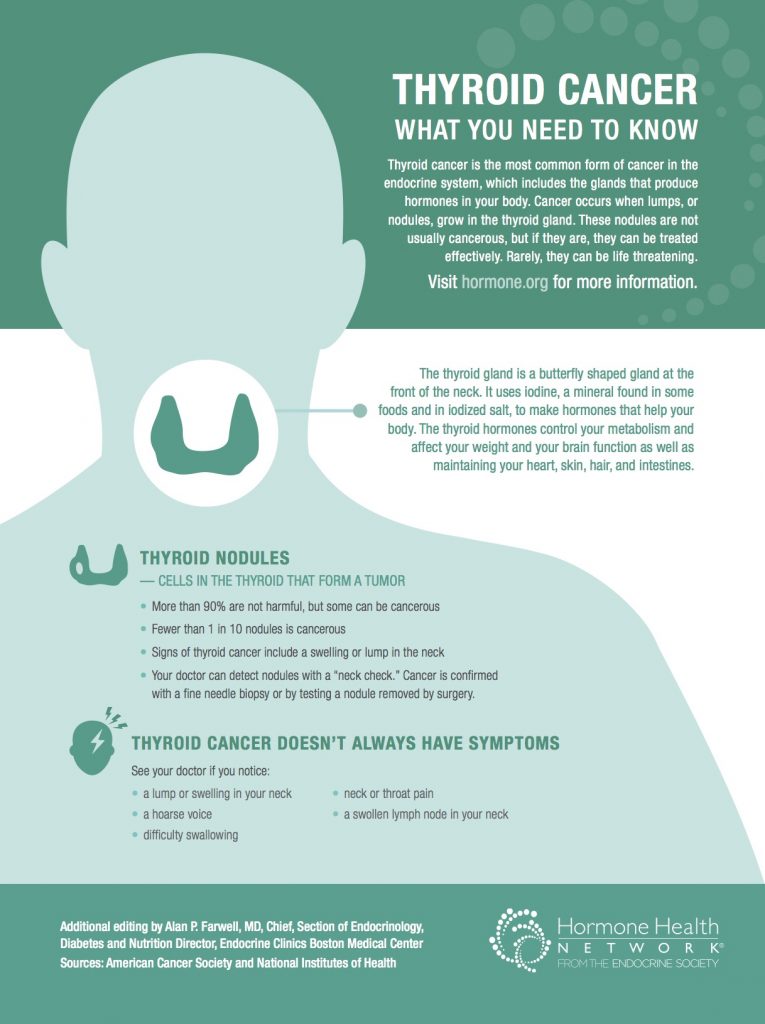Thyroid Cancer is common. The thyroid secretes hormones that help regulate body functions associated with the brain, eyes, heart, skin, hair, the intestine, and our metabolism. Thyroid cancer affects people of all ages, from young children to seniors. Due to the successful early diagnosis and quick, effective treatment modalities, the death rate from thyroid cancer has been low for years.
Whether you are a thyroid cancer survivor or you know someone who has struggled with it, it is important to understand the key facts about this type of cancer and help spread awareness for it.
Risk Factors
Similar to other types of thyroid diseases, thyroid cancers occur about 3 times more often in women versus men. Radiation is a major risk factor, and results from medical treatments, radiation fallout from power plant accidents or nuclear weapons. Past history of radiation therapy, especially during childhood, increases the risk for thyroid cancer.
About one-third of medullary thyroid carcinomas (MTCs) result from inheriting an abnormal gene. This familial medullary thyroid carcinoma can be detected through blood tests and can be prevented or treated early by removing the thyroid gland. If you have a family history of MTC, it may be a good idea to see a doctor who can test the rest of the family for the mutated gene.
Symptoms
Most cases of thyroid cancer are now detected earlier than before and can be treated successfully. Signs or symptoms include:
- A lump in the neck, sometimes growing quickly
- Swelling in the neck
- Pain in the front of the neck, sometimes up to the ears
- Continuing hoarseness or other voice changes
- Trouble swallowing
- Trouble breathing
- Constant cough that is not due to a cold
Physician’s recommend that folks regularly examine their own necks, looking and feeling for any growths or lumps. Lumps in the thyroid are common and usually benign, but it is important to see your doctor as soon as you detect any of these symptoms.
Treatments
Treatment depends on the type and the stage of your thyroid cancer. Treatment options include surgery, radioactive iodine treatment, thyroid hormone therapy, chemotherapy, and a few others. Often, two or more of these methods are combined. To make the correct choice, it is critical to be informed and to discuss them with your doctor.
Cancer care does not end after the treatments are finished. Lifestyle changes are necessary in order to live a healthy life after cancer. Quitting unhealthy habits, such as smoking, can have positive effects on your body. Fatigue can be very common in people who have undergone treatments for cancer. Although fatigue does not go away by resting, it can be reduced with exercise. Exercise is beneficial for both your physical and emotional health, making it one of the most helpful lifestyle changes you can make. There is no solid evidence on how one can prevent cancer from recurring, but making healthy lifestyle changes will positively impact your overall health, that is certain.
Nutritional Considerations
Nutritional consideration is given to those preparing for radioactive iodine treatment. These patients will need to follow a short-term low iodine diet (less than 50 micrograms per day) that involves the avoidance of iodized salt, sea salt, sea food, dairy products, egg yolks and whole eggs, bakery products with iodine-based dough conditioners, red dye #3, chocolate, soy products, iodine-containing supplements, and all foods supplements and medications that contain these ingredients. For more information visit the American Thyroid Association and the Thyroid Cancer Survivor’s Association.
Below is an infographic from the Hormone Health Network that highlights the key facts about thyroid cancer.

